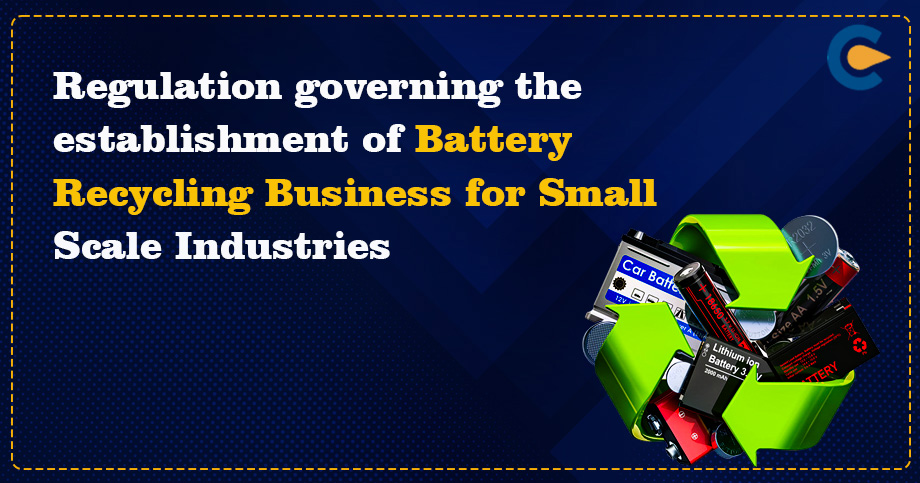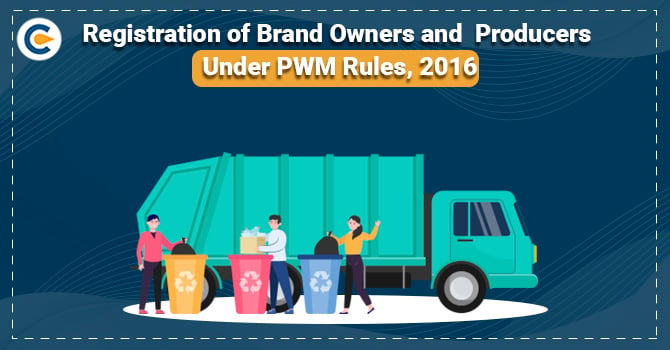With increasing digitalisation and a shift in the perspective of people towards more green technology, the battery market has seen an overall hike. This increase in the demand and usage of Batteries, although they have proven to be lucrative for manufacturers, is having an adverse effect on the environment. There is unregulated disposal of battery waste in landfills, which is creating toxins. When mixed with our environment and daily necessities, these toxins ultimately negatively impact human health. Therefore, to address this increasing issue government, through various initiatives and subsidies, is encouraging the Battery Recycling Business, especially for Small Scale Industries. This blog will elaborate on the regulation that governs the establishment of Battery Recycling businesses for Small Scale Industries.
Small Scale Industries
The industries where the process of manufacturing, services, and production is done at a smaller scale are considered Small Scale Industries regulated by the Ministry of Micro, Small and Medium Enterprise. They play a very important role in the Economic development and growth of India. Small Scale Industries must fall under the limits set by the Ministry. These are: –
- For Manufacturing Units for Goods: The plant and manufacturing unit investment must be between twenty-five lakhs and five crores
- For Service Providers: The plant and manufacturing unit investment must be between ten lakhs and two crores
Market Overview of Battery Recycling Business for Small Scale Industries
The battery recycling business market size is anticipated to hike from 13.54 billion Dollars in 2021 to 15.44 billion Dollars in 2022 at a compound annual growth rate (CAGR) of 14.1%. The battery recycling market size at the global level is expected to grow to $25.90 billion in 2026 at a CAGR of 13.8%. The main reason behind the growth of the Battery Recycling Business is the sudden increase in demand for Electrical vehicles and EEE (Electronic and Electrical Equipment)
Battery Waste Management Rules, 2022
In the most recent notification of the Ministry of Environment, forest and Climate Change, the authority introduced new Battery Waste Management Rules, 2022, replacing the old Battery (Management and handling) Rules, 2001, as per the power delegated under the Environment (Protection) Act, 1986[1]. The newly introduced rules have introduced the Extended Producers’ Responsibility policy on the Producers’/recyclers/refurbishers relating to the Management of Waste Battery in an environmentally sustainable way. These rules cover all and any Producer, recyclers, dealers, other entities, or consumer who work or is a part of the collection and transportation segregation or any other procedure that is part of the management of Waste Battery.
Along with this, these regulations are not only restricted to lead batteries but include all types of different batteries irrespective of their chemistry, material composition, volume, shape, use and weight, which consist of an Electric Vehicle Battery, automotive battery, Industrial Battery and Portable battery; these newly amended rules have many new stipulations related to definitions, authorisation processes and added responsibilities.
EPR Target
|
S.No. |
Type of Battery |
Recovery target for the year in percentage |
||
|
2024-25 |
2025-26 |
2026-27 and onwards |
||
|
1 |
Portable Battery |
70 |
80 |
90 |
|
2 |
Automotive Battery |
55 |
60 |
60 |
|
3 |
Industrial Battery |
55 |
60 |
60 |
|
4 |
Electric Vehicle Battery |
70 |
80 |
90 |
Benefits of Starting Battery Recycling Business for Small Scale Industries
The Battery Recycling Business proves not only beneficial for the Government by curbing environmental pollution but also proves beneficial for the manufacturers by saving their money as they do not have to spend a lot of capital on buying the Raw material. This business also reduces the need for various manufacturing plants relating to raw materials and other resources that are wasted for the extraction of those raw materials, which also causes a lot of pollution and irreversible damage to the health of workers working in the process.
Steps to start a Battery Recycling Business for Small Scale Industries
From analysing the Market Overview reports and Business Opportunities, Battery Recycling Business for Small Scale Industries is a very lucrative business. Therefore, for someone to establish a business, they have to follow specific steps that are: –
- Firstly, The Business Owner has to buy land with appropriate space for the establishment of manufacturing units
- One has to make a business plan containing a financial breakup, Marketing Plan, SWOT Analysis, and Overview of the Business.
- After this, one must acquire the General Business Setup License
- Create accounts with government-approved battery recycling centres.
- Recognising the Target Market
Machines Used In the Recycling Process
Because the process of recycling a battery is pretty exhaustive and lengthy, there are special machines or types of equipment used to complete the recycling process. Some of these machines are: –
- Belt Conveyor
- Double Shaft Shredder
- Material Collection System
- Activated Carbon Absorption System
General Business Setup Licenses
Before acquiring and compiling environmental authorisation, the business has to acquire general licenses and authorisation from the concerned governmental authorities.
Some of these licenses are: –
Company license
For setting up a Battery Recycling Business, one has to register according to the provisions of The Company’s Act, 2013, regulated by the Ministry of Corporate Affairs
Documents required for establishing the for Battery Recycling Business
- PAN Card;
- Address Proof such as
- Passport;
- Election Card or Voter Identity Card;
- Ration Card;
- Driving License;
- Electricity Bill;
- Telephone Bill;
- Aadhaar Card;
- Residential Proof such as
- Bank Statement
- Electricity Bill
- Telephone Bill
- Mobile Bill
- GST Registration Certificate;
- MOA (Memorandum of Association);
- AOA (Article of Association);
Factory license
For establishing their manufacturing units, owners have to register their business under Factories Act. Under this, they are mandated to get a Factory license, which the Chief Inspector approve of the Labour Commissioner Organisation after examining the operation site as mandated under the Factories Act, 1948.
Documents need for Setting up Recycling Business
For the Factory license, the documents that are required are: –
- Form 1;
- Layout plan/site plan;
- Aadhar Card;
- List of directors;
- MOA;
- AOA;
- Partnership deed;
- Account Details;
- Commencement date;
- Payment receipt;
- Land deeds;
- Consent form from SPCB/PCC
- Details of Hazardous and Non-Hazardous waste
- Tax receipt
Udyog Aadhaar MSME Registration
MSME (Micro, Small and Medium Enterprise) registration is mandatory for small and medium enterprises that are granted by the Ministry of Micro, Small and Medium Enterprise; one must apply through the authority’s online portal and upload the mandated documents.
Documents needed for MSME registration to be submitted with the authorisation application
- ApplicantOfficial Name
- Name and type of enterprise
- Aadhar Card
- PAN Number
- The NIC Code
- Account Details
- The social category of the applicant
- The business operations of the enterprise
- Date of Incorporation of a business
- Details related to employment
BIS Certificate
BIS Certificate is required to ensure that the products do not adversely affect public health. Per the BIS (Bureau of India Standards), the Recycler has to send the samples to be tested to the recognised lab, the report of which will be analysed and scrutinised by the official personnel. Once the report is reviewed, the Bureau of India Standards certificate is granted.
Documents required for BIS Certificate for Battery Recycling Business
- The list of raw materials that are being used during production
- A comprehensive layout/site plan
- A comprehensive clarification of the industrial procedure
- The particulars of the types of equipment being utilised
- A comprehensive depiction of the layout of the Plant
- The Test Reports of the recycled batteries that are to be issued only by a BIS Acknowledged Laboratory
- A complete photo of the Product
- A duly authorised Undertaking
- Identification Proof of the Applicant (Aadhar Card/PAN Card)
- Factory Authorisation Documents
- The submission form, which is accordingly complete and signed by the authorised personnel
GST Certificate
Document required for GST Certificate
- PAN Card
- CIN (Company Incorporation Certificate) from the Ministry of Corporate Affairs
- MOA
- AOA
- Applicant Adhaar Card
- Address proof
- Bank Details
Trade license for Battery Recycling Business
Municipal Corporation grants a trade license for Battery Recycling Business, which depends on the regulations set by the state. The documents required for Trade licenses are submitted along with the application.
Documents required for trade license for Battery Recycling Business
- Address proof (Electricity bill or water bill)
- Aadhaar card
- PAN
- Memorandum of Association (MOA)
- Certification of incorporating (CIN) in case of Companies
- A most recent municipal property tax acknowledgement receipt if the land of the Battery Recycling Business is owned, or a lease document or a consent letter of the owner of the land where the Battery Recycling business is registered.
- Layout plan/Site plan of the office
- NOC of the neighbours (nearby property owners)
Environmental Compliance for setting up for Battery Recycling Business
Along with obtaining the general licenses and authorisation, Battery Recycling Business also has to file for Environmental compliance, which is regulated by the Central Pollution Control Board and governed by the Ministry of Environment, Forest and Climate Change.
EPR Authorisation for Battery Recycling Business
EPR Authorisation is newly introduced for Battery Recycling Business that is governed under Battery Waste Management Rules, 2022. Recyclers must apply to the Central Pollution Control Board online Centralised portal, which is submitted with the mandated documents. Once the application is submitted, it is revised and inspected by authorities, resulting which the Recycler being provided with the authorisation.
Documents required for acquiring EPR Authorisation
- EPR plan;
- Financial breakup for fulfilling EPR;
- Self-declaration as per RoHS;
- Copy of consent issued by the concerned Union Territory’s Pollution Control Committee or State Pollution Control Board earlier in case of those recyclers who are working in the country before 01-10-2016;
- Particulars of upcoming awareness programmes and related initiatives;
- Copy of the approval from the relevant state/central authority for marketing various products or for doing the Battery Recycling Business as given below:
- TIN details;
- PAN details;
- Incorporation certificate;
- Copy IEC;
- TIN details;
- Copies of contract documents with other Stakeholders like Manufacturers, collection centres, dismantlers, dealers, treatment, storage and disposal facilities (TSDFs) etc.
Specifics of EPR (Extended Producers’ Responsibility) form as per Battery Waste Management Rules, 2022
- Producer’s/Recyclers Name
- Registered address of Producer, official website address and contact information
- Name of the authorised entity and whole address with official e-mail, landline telephone number and mobile number
- Tax Identification Number
- Copy of GST Certificate
- Different Battery Types placed in the market name of the brand:
- Industrial Battery
- Portable Battery
- EV Battery
- Automotive Battery
Consent Certificates
- CTE (Consent to Establish) is obtained by a Battery Recycling Business owner before the industry is established under the Water and Air (Prevention and Control of Pollution) Act
- CTO (Consent to Operate) is obtained by a Battery Recycling Business owner after the industry is established and is ready to start the production process under the Water and Air (Prevention and Control of Pollution) Act
The process of both the consent certificates (Consent to Establish and Consent to Operate) is authorised under the Air and Water Act, which follows the similar steps of applying through the centralised online portal of the concerned Union Territory’s Pollution Control Committee or State Pollution Control Board, along with documents/certificates/licenses required by the Central Pollution Control Board, which are then followed by an assessment of an application by the concerned authority. After that, a site inspection may take place by the official government personnel who make the report as per the finding of the inspection, according to which the certificate is granted.
Documents required for consent certificate
- Authorisation Letter
- Pan Card
- The Aadhar Card
- SSI Certificate;
- DG Specifications
- Raw material list with daily MTD/monthly quantity
- Effluent / Sewage Treatment Plant Flow Diagram
- Industry Department Certificate;
- Specifics on air pollution controls
- Product/by-product list with daily MTD/monthly quantity
- The layout plan/Site plan;
- Total constructed area
- The project report
- Municipality or Industry license
- Registration Proof of unit
- Site Plan
- Water Bill
- Details on channelisation;
- Total open land
- Water usage breakdown
- Boiler type, fuel used, and quantity
- Permission from the state’s groundwater authority.
- Factory/Trade License
Hazardous Waste Authorisation
The registration/authorisation relating to the Management and regulation of hazardous waste, including the recycling procedure of Battery Recycling Business, is regulated under The Hazardous Wastes (Management, Handling and Transboundary Movement) Rules, 2008.
Documents required for submission
The documents which are compulsory while applying for hazardous waste Authorisation are: –
- CTO;
- Certificate of incorporation (CIN)/LLP;
- CTE;
- MOA (Memorandum Of Association);
- AOA (Article of Association);
- Board resolution for appointing an authorised person;
- Aadhar card;
- PAN copy;
- Layout Plans;
- GST certificate of business;
- Rent/proof of ownership;
- Factory license/Trade license
Business Opportunity for Electric Vehicle Business
One of the biggest markets for the Recycling Battery Business is the automotive (Electric Vehicle) sector which has a lot of business opportunities in numerous fields. Some of the most lucrative business opportunities are: –
- EV Equipment Manufacturing
- Home charging stations
- Public EV charging Stations
- solar electric vehicle charging
- Battery Recycling Business
- Battery swapping Technology
- EV Franchise and Dealership
Conclusion
Battery Recycling Businesses have a lot of potential for small-scale industries, especially in the current environment when our market is shifting from linear economy to circular economy and the government is providing subsidies for the recycling business given that they get the proper authorisation from the concerned state or central authorities especially those that are mandated under the Battery Waste Management Rules, 2022.
Read our Article:How to set up a Lithium-ion battery recycling business in India?











